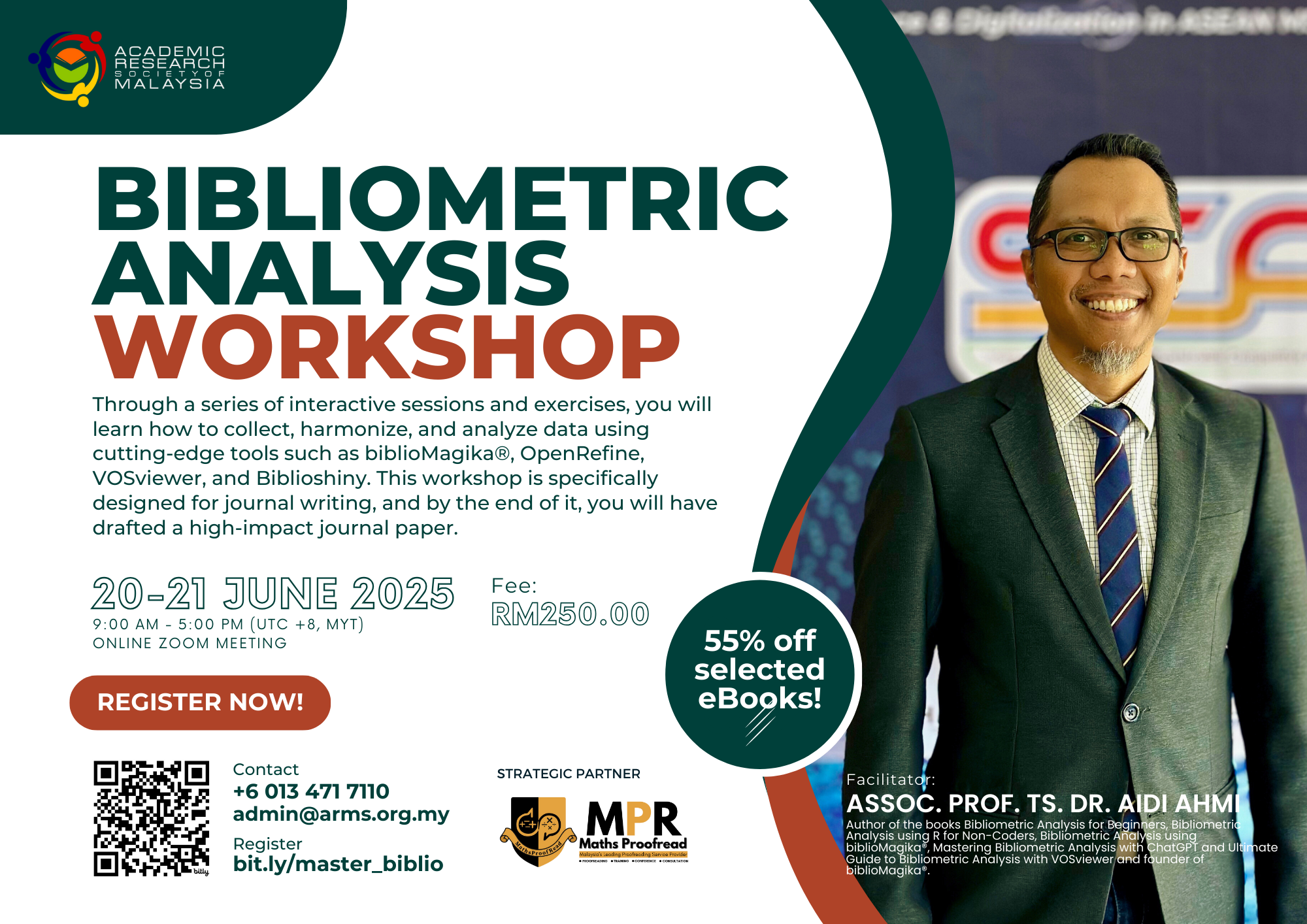Workshop Details
| Date | Friday & Saturday, 16 - 17 May 2025 |
| Time | 9.00 am - 5.00 pm (Kuala Lumpur Time) |
| Venue | Online (Zoom) |
| Registration Fee | RM250.00 |
| Facilitator | Assoc. Prof. Ts. Dr. Aidi Ahmi |
About Facilitator
Dr. Aidi Ahmi is an Associate Professor at the Tunku Puteri Intan Safinaz School of Accountancy, Universiti Utara Malaysia (UUM). He obtained his Ph.D. in Information Systems and Computing from Brunel University London, United Kingdom. He is a member of the Malaysian Institute of Accountants (MIA) and has been recognized as a Professional Technologist (Ts.) by the Malaysia Board of Technologies (MBOT). Dr. Ahmi is also a lifetime member of the Malaysian Accounting Association (MyAA) and Internet Society (ISOC) Malaysia. Currently, he actively shares his knowledge of bibliometric analysis through workshops and training organized by higher learning institutions, associations, and training institutions. Dr. Aidi Ahmi is the author of four books on bibliometrics: "Bibliometric Analysis for Beginners", "Bibliometric Analysis using R for Non-Coders", "Bibliometric Analysis using biblioMagika®", and "Mastering Bibliometric Analysis with ChatGPT". He has also published numerous articles on bibliometric studies in high-impact journals. With over 100 journal article publications and successful supervision of eight Ph.D. graduates in the fields of accounting, information systems, auditing, and information and communication technology, he is actively engaged in academic research and mentorship. Additionally, Dr. Aidi Ahmi is involved in consulting projects and is currently participating in the Citation & Infometric Division, Ministry of Higher Education Malaysia, for the Bibliometric Project on the Performance of Malaysian Scholarly Outputs 2017-2021. For more information about him, please visit his website at www.aidi-ahmi.com
Workshop Benefits
✓ Comprehensive workshop materials with over 750MB size of resources.
✓ Complimentary templates for writing and analysis.
✓ Video recordings with lifetime access.
✓ Post-workshop coaching through WhatsApp group.
✓ E-certificate provided upon completion.
✓ Exclusive discounts on facilitator’s books.
Workshop Tentative
| Time | Itinerary |
| DAY 1 | |
| 08:50 am - 09:00 am | Registration |
| 09:00 am - 12:45 pm | PART 1: IDENTIFYING THE TOPIC AND GETTING THE DATASET |
| 12:45 pm - 02:45 pm | Lunch Break and Friday Prayer |
| 02:45 pm - 05:00 pm | PART 2: CLEANING AND HARMONISING THE BIBLIOGRAPHICAL DATA |
| DAY 2 | |
| 09:00 am - 01:00 pm | PART 3: CONDUCTING BIBLIOMETRIC ANALYSIS |
| 01:00 pm - 02:00 pm | Lunch Break |
| 02:00 pm - 04:00 pm | PART 3: CONDUCTING BIBLIOMETRIC ANALYSIS (Cont.) |
| 04:00 pm - 05:00 pm | PART 4: DRAFTING BIBLIOMETRIC PAPER FOR HIGH IMPACT JOURNAL |
Who Should Attend?
✓ Postgraduate Student
✓ Researcher
✓ Librarian
✓ Publisher
✓ Anyone who interested to learn about bibliometric analysis
Payment
Payment can be via bank transfer to:
Bank Name: MALAYAN BANKING BERHAD (MAYBANK)
Account Name: ACADEMIC RESEARCH SOCIETY OF MALAYSIA
Account No.: 552 095 223 741
or SenangPay at:
https://app.senangpay.my/payment/164631337599
(For the international participants, payment can be made using SenangPay)
Registration
x
Enquiry
For enquiry, please contact:
Ms. Hanis Sofia
WhatsApp: http://wasap.my/60134717110
E-mail:






